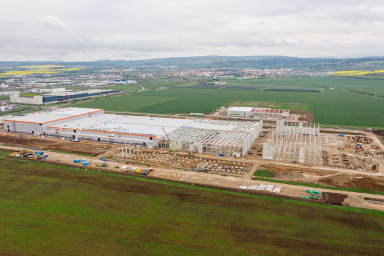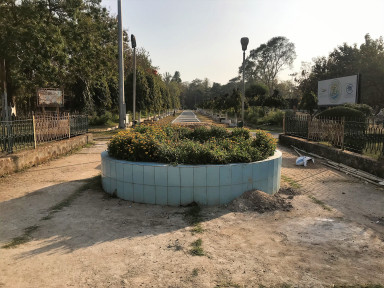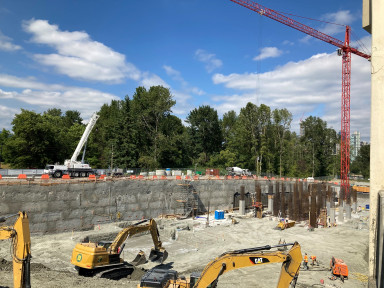The spatial politics of global interdependencies
Large-scale Chinese ‘green’ investment projects and small-town development in eastern Germany
The research addresses Chinese foreign direct investment (FDI) in Europe’s energy and mobility transition as an opportunity and challenge for urban future-making. Against the complexity of large-scale Chinese ‘green’ investment projects, the significant shift in Sino-German cooperation to the sub-national level, and the resulting transfer of related responsibility onto local decision-makers, the thesis examines the evolving agency of local planning, administration, and policy professionals involved in ground-level implementation processes. Therefore, it focuses on recent investments in the production, research, and recycling of electric vehicle (EV) battery cells and their related imaginings and manifestations of urban future-making in the case of two peripheral small towns in eastern Germany, a region which has recently become a strategic investment location for East Asian firms.
- green transition
- global China
- extended urbanization
- eastern Germany
- local agency
- peripheral centralities
- institutional ethnography
Context
Decarbonizing the European energy and mobility sector would represent a major milestone towards achieving the targets of the European Green Deal and thus tackling global climate crisis. A key technology for this is EV battery cells, whose production has become dominated by East Asian, especially Chinese, manufacturers in recent years. Since 2019, strategic Chinese FDI in the European battery sector and related research, manufacturing, recycling, energy, and logistics infrastructures has been steadily increasing. Investment sites in the new federal states of eastern Germany seem to be of particular interest, as they are strategically located close to European car manufacturers and can draw from a long tradition of skilled labour in the automotive supply industry. In this context, Sino-German cooperation is increasingly shifting from the national to the sub-national level, which gives a key role to local and regional professionals in negotiating and implementing Chinese FDI on the ground.
Aims
Against the complexity of large-scale Chinese ‘green’ investment projects and the shift of Sino-German cooperation to the sub-national level, the thesis aims to empirically capture the evolving agency of local planning, administration, and policy professionals involved in implementation processes in the case of eastern Germany. Based on a cumulative thesis approach, the research engages with a multi-scalar analysis on three levels:
(1) Geographical configurations and scales (‘where’): Following on from debates on extended urbanization and the call for its conceptual and empirical underpinning,¹ the research aims at investigating the manifold geographical configurations related to the growth of China’s global supply chain network to discuss the multilayered dimensions of recent Chinese infrastructure developments in eastern Germany.
(2) Organizational strategies and actions (‘how’): Based on an empirical study of implementation processes in the peripheral small towns of Arnstadt and Bitterfeld-Wolfen, the evolving local and regional planning, administration, and policy actions is discussed. The results inform debates on the peripheralization of small towns in eastern Germany and the rescaling of state power on the sub-national level.²
(3) Agency-related effects and consequences (‘so what’): Following recent calls for site-specific empirical inquiries to advance a more nuanced understanding of ‘global China’,³ the research highlights the diverse variations, fractures, and uncertainties inherent to site-specific implementation processes. Thus, the actual effects of implementing large-scale Chinese ‘green’ investment projects for local planning, administration, and policy professionals and their individual agency are reflected.
Research design
The work combines critical urban theory with qualitative methods of urban ethnography. The research cases are constituted by, firstly, Chinese FDI in new battery cell production and related urban infrastructure in Arnstadt (Thuringia) as well as, second, a recently failed investment in Bitterfeld-Wolfen (Saxony-Anhalt).

It is assumed that insights into failed processes provide equally important insights into mechanisms of Sino-German cooperation and related issues of agency. Thinking of everyday practices, habits, and routines of the local professionals who shape the implementation processes of large-scale projects requires the need to consider their situated practices. Likewise, the institutions, laws, and regulations their decision-making processes are embedded in need to be understood. Following this, the research adapts an ‘institutional ethnography’ to the context of urban studies: social research on people’s everyday interactions that makes tangible the multi-scalar relations that coordinate people’s activities within institutions and can account for the ‘ruling relations’⁴ that enter into and organize everyday interactions. The research builds on three empirical data sets: (1) the analysis of textual sources including land use and urban development plans, urban/regional development policies, company websites, FDI data archives, business directories, newspaper reports, and social media sources; (2) qualitative expert interviews with representatives and members of institutions ranging from state development agencies and ministries, to local planning authorities, to external planning agencies; and (3) ethnographic explorations and participatory observations during meetings within development agencies and planning authorities, or public information events.
Supervisors:
- Prof. Dr. Monika Grubbauer
- Prof. Dr. Nina Gribat
- Prof. Dr. Tim Bunnell



